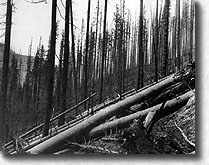|
Stories
|
|
The 1910 Fire Eyewitness accounts from 1910 Fire Was the 1910 fire the largest? A Clash of Titans Relations of Forests & Forest Fires Could the 1910 fire happen again? |
 It took courage to start more fires with surrounding country already a sea of fire and the wind a veritable fury, but it was our only chance; so a line of men was stationed just a few feet apart, forming a letter "s", from the Morning to the Hunter mills, just a few feet in the rear of the buildings. At the signal each started a blaze. These fires united in less time than it takes to relate it, and traveled up the mountains, leaping, foarning, rippling over the brush and grass, then bursting into crimson towers as they passed over stately pines and fires. It was a most beautiful sight yet a most terrible one ... Midnight was as light as day.
It took courage to start more fires with surrounding country already a sea of fire and the wind a veritable fury, but it was our only chance; so a line of men was stationed just a few feet apart, forming a letter "s", from the Morning to the Hunter mills, just a few feet in the rear of the buildings. At the signal each started a blaze. These fires united in less time than it takes to relate it, and traveled up the mountains, leaping, foarning, rippling over the brush and grass, then bursting into crimson towers as they passed over stately pines and fires. It was a most beautiful sight yet a most terrible one ... Midnight was as light as day.